Key Takeaways
- Stay Ahead: Gain insights into the latest AI trends and statistics of 2024, ensuring you’re equipped to navigate the ever-evolving landscape of artificial intelligence.
- Data-Driven Decisions: Harness the power of fact-checked AI statistics to inform strategic decision-making, whether you’re a business leader, policymaker, or technology enthusiast.
- Future-Proofing: Understand the transformative potential of AI and its impact on industries, economies, and societies, empowering you to prepare for the opportunities and challenges that lie ahead.
In the rapidly evolving landscape of artificial intelligence (AI), where innovation is the norm and breakthroughs are a daily occurrence, staying informed is not just advantageous – it’s essential.
As we journey through 2024, the realm of AI continues to expand its boundaries, catalyzing transformative changes across industries, reshaping business landscapes, and redefining the way we interact with technology.
Now more than ever, having access to accurate, up-to-date insights is paramount for businesses, policymakers, researchers, and enthusiasts alike.
Welcome to our comprehensive exploration of the Top 71 Latest AI Statistics in 2024, meticulously fact-checked and verified to provide you with the most reliable and insightful data available.
This exhaustive compilation serves as a roadmap through the complex and multifaceted world of AI, offering a panoramic view of the trends, advancements, and challenges shaping the AI landscape today.
As we embark on this journey, prepare to delve deep into the realms of machine learning, neural networks, natural language processing, computer vision, and beyond.
From the boardrooms of Fortune 500 companies to the laboratories of cutting-edge research institutions, AI is permeating every facet of society, driving innovation, and unlocking new possibilities.
Our meticulously curated collection of AI statistics covers a wide spectrum of topics, ranging from AI’s impact on industry sectors such as healthcare, finance, manufacturing, and retail to its implications for job markets, economic growth, and societal well-being.
With each statistic rigorously fact-checked and analyzed, you can trust that the insights presented here are not just informative but also accurate and reliable.
Whether you’re a seasoned AI professional seeking to stay ahead of the curve, an entrepreneur looking to leverage AI for business growth, or a curious individual eager to understand the implications of AI on our world, this compendium of AI statistics offers something for everyone.
Join us as we navigate the frontiers of AI, uncovering trends, debunking myths, and charting the course for a future powered by intelligent machines.
So, fasten your seatbelts, and get ready to embark on a journey through the fascinating world of artificial intelligence.
Together, let’s unlock the potential of AI and harness its transformative power to create a brighter, more innovative future for all.
Before we venture further into this article, we like to share who we are and what we do.
About 9cv9
9cv9 is a business tech startup based in Singapore and Asia, with a strong presence all over the world.
With over eight years of startup and business experience, and being highly involved in connecting with thousands of companies and startups, the 9cv9 team has listed some important learning points in this overview of the Top 71 Latest AI Statistics in 2024.
If your company needs recruitment and headhunting services to hire top-quality employees, you can use 9cv9 headhunting and recruitment services to hire top talents and candidates. Find out more here, or send over an email to [email protected].
Or just post 1 free job posting here at 9cv9 Hiring Portal in under 10 minutes.
Top 71 Latest AI Statistics in 2024 (Fact-Checked)
AI Market Size Statistics, Numbers and Data in 2024
- The global AI market is valued at USD 184 billion
- The AI market is expected to grow to USD 827 billion by 2030
- The United States has the largest AI market at USD 50 billion
- The market size for Generative AI is USD 36 billion
- AI market value is projected to increase 4.5x over the next 6 years
- Global AI Revenue is expected to grow to USD 100 billion in 2025
- AI is projected to grow at a CAGR of 36.6% from 2024 to 2030
- AI revenue will increase by over 6x in the next 5 years
- Wearable AI market is expected to reach USD 180 billion by 2025
- AI can increase revenue by over USD 15 trillion by 2030
- China will reap the greatest economic gains from AI with 26% predicted boost to GDP in 2030
- AI chip revenue will surpass USD 80 billion by 2027
- China will account for more than 25% of the global AI market by 2030
- Netflix’s AI recommendation technology is worth USD 1 billion in revenue annually
- The manufacturing industry stands to gain USD 3.78 trillion from AI by 2035
- AI-powered self-driving vehicles garner more than USD 170 billion in annual revenue worldwide
- AI tech is expected to increase banking industry revenue by USD 1 billion by 2035
- AI telecommunications market is worth USD 2.5 billion
ChatGPT Statistics, Numbers and Data in 2024
- ChatGPT reached 1 million users in 5 days
- ChatGPT has around 180.5 million users in 2024
- ChatGPT has 100 million weekly users
AI Adoption Statistics, Numbers and Data in 2024
- 90% agree that AI represents a business opportunity for their company
- Only 10% of companies obtain significant financial benefits from AI
- 57% of managers said their companies are piloting or deploying AI
- Only 59% of managers have an AI strategy
- 70% of managers understand how AI can generate business value
- Over 80% of managers in the retail & consumer space expect to use AI automation by 2025
- 42% of IT professionals at large organizations report that they have actively deployed AI
- 40% of IT professionals are actively exploring using AI Technology
- 38% of IT professionals report that they are actively implementing Generative AI
- 42% of IT professionals are only exploring implementing Generative AI
- Organisations in India (59%) are leading the way in adopting AI
- France (26%) is lagging behind other countries in AI adoption
- About 50% of IT professionals within the financial industry has actively deployed AI
- 37% of IT professionals in the telecommunications industry are also deploying AI
- 59% of IT professionals deploying or exploring AI report accelerated investments of AI
- Research and Development (44%) is one of the top AI investments at companies
- 45% say advances in AI tools that make them more accessible is one of the top factors driving AI adoption
- 43% say one of the most important changes to AI are solutions that are easier to deploy
- 33% agree that the AI use cases driving adoption are for the automation of IT processes
- 33% say limited AI skills and expertise the main factor hindering them at adopting AI
- 57% say data privacy concern one of the biggest inhibitors of generative AI
- Between 2015 and 2019, the number of companies using AI grew by 270%
- 83% of executives believe AI is a strategic priority for their businesses
- 75% of executives say that AI will allow them to move into new businesses and ventures
- 86% of CEOs agree that AI and business go hand-in-hand since AI is mainstream technology in their offices
- There is a 75% increase in AL projects deployed from 2021 to 2022
- Businesses already using AI at scale are performing an average of 11.5% better than those who are not
- AI will power 95% of customer interactions by 2025
- Around 40% of marketers agree that using AI for email marketing generates higher market revenue
AI Usage Statistics, Numbers and Data in 2024
- 56% of business owners are using AI for customer service
- 51% of business owners use AI for cybersecurity and fraud management
- 73% of businesses use or plan to use AI-powered chatbots for instant messaging
- 53% apply AI to improve production processes
- 64% of business owners anticipate AI will improve customer relationships
- 24% of business owners worry AI might affect their business’s visibility on search engines
- 40% of Business Owners Are Concerned About AI Dependence
- Around 33% of Businesses Are Concerned About Misinformation From AI
- 97% of business owners believe that ChatGPT will have a positive impact on their operations
- 74% of business owners anticipate ChatGPT assisting in generating responses to customers through chatbots
- 90% of business owners believe that ChatGPT will positively impact their businesses within the next 12 months
- AI is expected to improve employee productivity by 40%
- 48% of businesses say they use data analysis, machine learning, or AI tools to address data quality issues
- AI algorithms increase lead generation by as much as 50%
Job and Employment in AI Statistics, Numbers, and Data in 2024
- AI will create 97 million new jobs by 2025
- 20% of managers say they do not have employees with the right skills in place to use new AI or automation tools
- 55% are using AI to reduce manual or repetitive tasks with automation tools
- Only 34% of managers are currently training employees to work with new AI tools
- Around 33% of Businesses Are Concerned AI Will Cause Workforce Reduction
- Transportation and storage workers face a 56.4% risk of job automation from AI
- AI is expected to replace 16% of all US jobs in less than half a decade
AI Market Size Statistics, Numbers and Data in 2024
1. The global AI market is valued at USD 184 billion
(Statista)
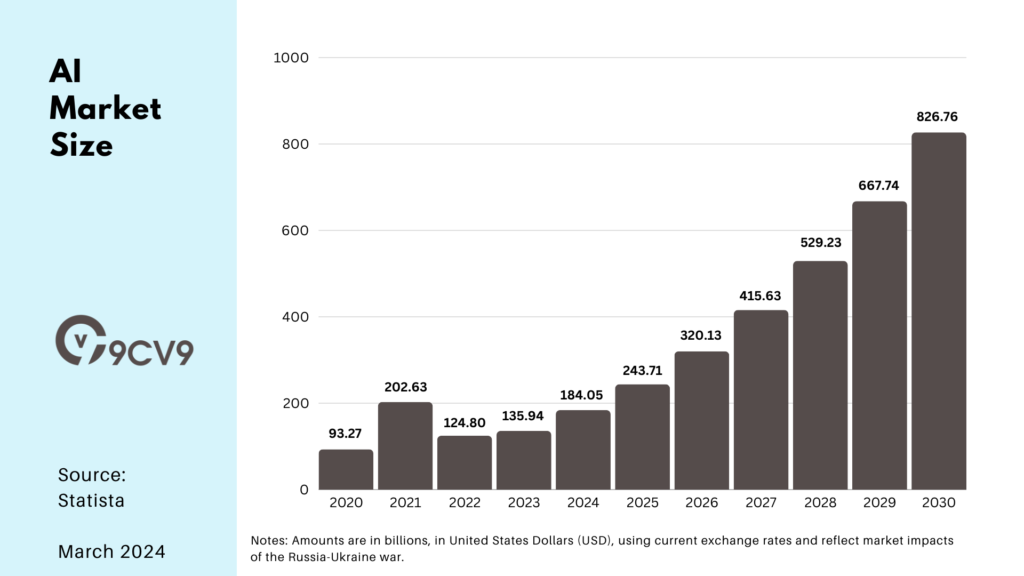
The projected value of the global AI market reaching USD 184 billion in 2024 represents a significant milestone in AI’s rapid expansion, highlighting its pervasive impact across industries. This growth, fueled by advancements in machine learning and other AI technologies, underscores the transformative changes AI is driving in business operations and innovation worldwide. While this projection signals vast economic potential and opportunities for societal advancement, it also emphasizes the importance of addressing ethical considerations and biases inherent in AI systems to ensure responsible development and equitable outcomes for all stakeholders.
2. The AI market is expected to grow to USD 827 billion by 2030
(Statista)
The projected growth of the AI market to USD 827 billion by 2030, with a compound annual growth rate (CAGR) of 28.46% from 2024 to 2030, signifies a monumental surge in the adoption and integration of artificial intelligence technologies worldwide. This exponential expansion underscores AI’s increasingly pivotal role across industries, from healthcare and finance to manufacturing and retail. Fueled by rapid advancements in machine learning algorithms, natural language processing, and computer vision, AI is poised to revolutionize business operations, drive innovation, and enhance decision-making processes on an unprecedented scale. However, alongside this remarkable growth comes the imperative for stakeholders to address ethical considerations, privacy concerns, and potential biases inherent in AI systems, ensuring responsible development and deployment practices that prioritize fairness, transparency, and accountability. As organizations and governments continue to invest in AI research and development, the trajectory of AI’s evolution holds immense promise for shaping the future of technology and society as a whole.
3. The United States has the largest AI market at USD 50 billion
(Statista)
The United States is poised to maintain its position as the global leader in AI adoption and market size, with an estimated market value of US$50.16 billion in 2024. This substantial market share reflects the nation’s robust ecosystem for technological innovation, including a wealth of AI talent, world-renowned research institutions, and a supportive regulatory environment. With a diverse array of industries leveraging AI solutions to drive efficiency, productivity, and competitiveness, the US remains at the forefront of AI-driven transformation, spanning sectors such as healthcare, finance, retail, and manufacturing. Moreover, continued investment in AI research and development, coupled with strategic partnerships between academia, industry, and government, further solidifies the nation’s position as a global powerhouse in artificial intelligence. As the US continues to lead the charge in AI innovation, it sets the stage for driving forward the next wave of technological advancements and shaping the future of AI on a global scale.
4. The market size for Generative AI is USD 36 billion
(Statista)
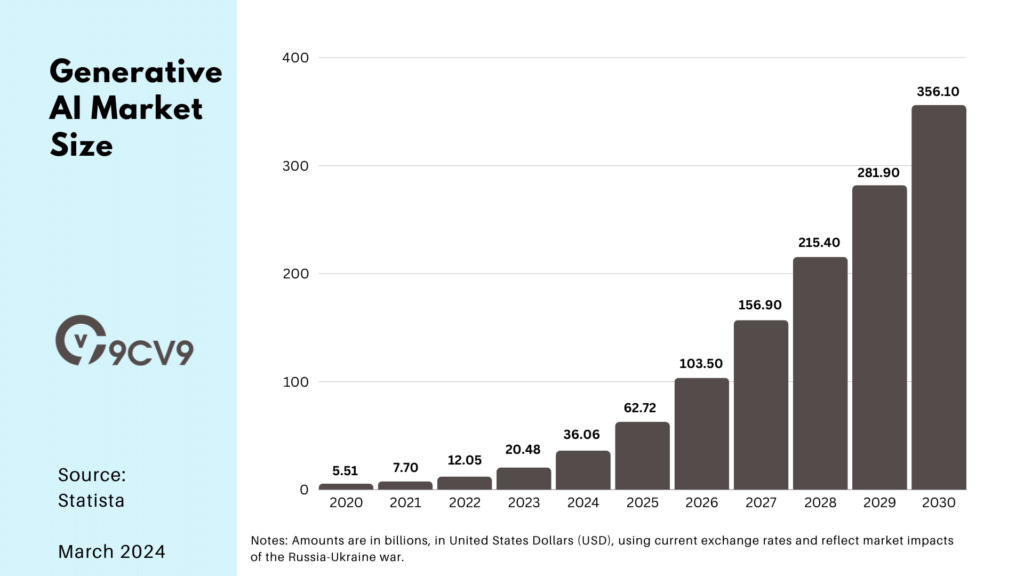
The market size for Generative AI, estimated at USD 36 billion, underscores the growing prominence of this cutting-edge technology in various industries. Generative AI, characterized by its ability to create new content, images, or even entire worlds autonomously, represents a significant advancement in machine learning capabilities. From generating realistic images and videos to aiding in drug discovery and synthetic data generation, Generative AI holds immense potential for driving innovation and unlocking new opportunities across sectors such as entertainment, healthcare, and cybersecurity. As organizations increasingly harness the power of Generative AI to streamline creative workflows, optimize resource utilization, and fuel product innovation, we can expect continued growth and evolution in this dynamic field, shaping the future of AI-driven creativity and problem-solving.
5. AI market value is projected to increase 4.5x over the next 6 years
(9cv9)
The projected increase in the AI market value from USD 184 billion in 2024 to USD 827 billion in 2030, marking a 4.5x growth over the next six years, reflects the unprecedented pace of expansion and adoption within the artificial intelligence landscape. This exponential growth trajectory underscores the transformative impact AI is poised to have across industries worldwide, driving innovation, efficiency, and competitiveness. Fueled by advancements in machine learning, natural language processing, and computer vision, AI technologies are reshaping business models, revolutionizing customer experiences, and unlocking new opportunities for growth and differentiation. Moreover, as organizations continue to invest in AI research and development, coupled with regulatory support and strategic partnerships, the stage is set for AI to become an indispensable cornerstone of the digital economy, shaping the future of work, commerce, and society at large.
6. Global AI Revenue is expected to grow to USD 100 billion in 2025
(Omdia)
The forecasted growth of global AI revenue to USD 100 billion in 2025 signifies the escalating demand and adoption of artificial intelligence technologies across industries worldwide. This substantial increase underscores the pivotal role AI plays in driving business transformation, innovation, and competitiveness. From enhancing operational efficiency and automating repetitive tasks to enabling data-driven decision-making and personalized customer experiences, AI applications are increasingly becoming indispensable assets for organizations seeking to thrive in the digital age. Furthermore, this projected revenue surge reflects a broader trend of heightened investment in AI research and development, as well as growing confidence among businesses in the potential of AI to deliver tangible value and sustainable growth. As AI continues to evolve and permeate diverse sectors, its impact on reshaping business models, industries, and economies is poised to accelerate, ushering in a new era of unprecedented opportunity and innovation.
7. AI is projected to grow at a CAGR of 36.6% from 2024 to 2030
(Grand View Research)
The projection of AI growing at a Compound Annual Growth Rate (CAGR) of 36.6% from 2024 to 2030 signifies a remarkable trajectory of expansion and adoption within industries worldwide. This growth is propelled by the relentless research and innovation efforts led by tech giants, paving the way for advanced technologies to permeate various verticals including automotive, healthcare, retail, finance, and manufacturing.
8. AI revenue will increase by over 6x in the next 5 years
(Omdia)
The staggering growth trajectory of the AI market, as evidenced by its revenue figures, highlights the rapid evolution and expanding influence of artificial intelligence across industries. From generating approximately $19.4 billion in revenue in 2020 to reaching an estimated $62.5 billion in 2022, the AI market has experienced significant expansion within a relatively short timeframe. Moreover, the forecasted revenue of $126 billion by 2025 underscores the projected acceleration of AI adoption and investment, driven by advancements in AI technologies, increasing demand for AI-driven solutions, and growing recognition of AI’s potential to drive innovation and competitiveness. As businesses continue to harness the capabilities of AI to optimize operations, enhance decision-making, and deliver personalized experiences, the AI market is poised for continued growth and transformation, reshaping industries and redefining the future of work and society.
9. Wearable AI market is expected to reach USD 180 billion by 2025
(Global Market Insights)
The projected growth of the global wearable AI market, buoyed by the success of products like the Apple Watch and Fitbits, underscores the increasing integration of AI technologies into wearable devices and the growing demand for smart, personalized experiences. With the market expected to reach a value of $180 billion by 2025, there is a clear recognition of the transformative potential of wearable AI in reshaping healthcare, fitness, and lifestyle industries. These wearable devices, equipped with AI capabilities such as real-time health monitoring, predictive analytics, and personalized recommendations, offer users unprecedented insights into their health and well-being, driving adoption and fueling market growth. Moreover, as advancements in AI algorithms and sensor technologies continue to evolve, wearable AI devices are poised to become even more sophisticated, offering enhanced functionalities and driving further market expansion. Ultimately, the projected growth of the wearable AI market underscores its significance in empowering individuals to lead healthier, more connected lives in the digital age.
10. AI can increase revenue by over USD 15 trillion by 2030
(PwC)
The projected revenue of $15.7 trillion by 2030 generated by AI technology signifies its immense potential to drive economic growth and prosperity on a global scale. With AI poised to boost the GDP of local economies by an additional 26%, there is a clear recognition of its transformative impact across industries and sectors. AI technologies, ranging from machine learning and natural language processing to robotics and automation, offer unprecedented opportunities for businesses to enhance productivity, efficiency, and innovation. By harnessing AI’s capabilities to optimize processes, unlock new revenue streams, and deliver personalized experiences, businesses can drive sustainable growth and competitiveness in the digital era. Moreover, AI’s potential to drive economic growth extends beyond business operations to areas such as healthcare, transportation, and education, where AI-driven innovations have the power to improve outcomes, enhance quality of life, and address societal challenges. As governments, businesses, and individuals continue to invest in AI technologies and embrace AI-driven solutions, the potential for economic growth and prosperity is vast, paving the way for a future powered by intelligent automation and innovation.
11. China will reap the greatest economic gains from AI with 26% predicted boost to GDP in 2030
(PwC)
The projected economic gains from AI in China and North America, with a 26% boost to GDP in China and a 14.5% boost in North America by 2030, reflect the significant contributions of these regions to the global AI landscape. China’s rapid advancement in AI technologies and its strategic investments in AI infrastructure and innovation ecosystems position it as a key driver of AI-driven economic growth. Similarly, North America, with its robust tech industry, innovative startups, and advanced research institutions, is poised to capitalize on the opportunities presented by AI to drive productivity, innovation, and competitiveness. Together, China and North America are projected to account for almost 70% of the global economic impact of AI, equivalent to $10.7 trillion, underscoring their pivotal role in shaping the future of AI-powered economies. As these regions continue to invest in AI research, development, and adoption, they are expected to maintain their leadership positions in the global AI landscape, driving sustainable growth and prosperity in the digital age.
12. AI chip revenue will surpass USD 80 billion by 2027
(The Insight Partners)
The projection that AI chip revenue will exceed USD 80 billion by 2027 underscores the critical role of specialized hardware in supporting the rapid growth and adoption of artificial intelligence technologies. As AI applications become increasingly complex and demanding, the need for high-performance computing solutions tailored to AI workloads becomes more pronounced. AI chips, optimized for tasks such as machine learning, deep learning, and neural network inference, are essential components in accelerating AI computations and enabling real-time decision-making. With the proliferation of AI-driven applications across industries such as healthcare, automotive, finance, and telecommunications, the demand for AI chips is expected to surge, driving significant revenue growth in the AI chip market. Moreover, as AI algorithms and models continue to evolve, there will be ongoing demand for more powerful and efficient AI chips, further fueling market expansion. Overall, the projected revenue growth in the AI chip market reflects the increasing importance of hardware innovation in advancing the capabilities and scalability of AI technologies.
13. China will account for more than 25% of the global AI market by 2030
(Globe News Wire)
The forecast that China’s AI industry will reach approximately $40.6 billion by 2026, with a Compound Annual Growth Rate (CAGR) of 39.1%, underscores the country’s rapid advancement and significant investment in artificial intelligence technologies. As the world’s second-largest economy, China has made substantial commitments to AI research, development, and deployment, positioning itself as a global leader in the AI landscape. The projected growth trajectory reflects China’s ambition to leverage AI as a strategic driver of economic growth, innovation, and competitiveness. Moreover, by 2030, China is expected to account for 26.1% of the global AI market share, further solidifying its position as a dominant player in the global AI ecosystem. With initiatives such as the “New Generation AI Development Plan” and strategic investments in key AI sectors, China is poised to capitalize on the transformative potential of AI to drive sustainable economic development and reshape industries. Overall, these projections underscore China’s pivotal role in shaping the future of AI and its profound impact on the global economy.
14. Netflix’s AI recommendation technology is worth USD 1 billion in revenue annually
(Business Insider)
The acknowledgment that Netflix’s recommendations technology, powered by AI, contributes approximately $1 billion in revenue annually underscores the significant impact of AI-driven personalization in driving consumer engagement and revenue growth. By leveraging AI algorithms to analyze user preferences, viewing habits, and content interactions, Netflix can deliver highly personalized recommendations that resonate with individual viewers, enhancing their overall streaming experience and encouraging continued usage. Indeed, Netflix’s effective use of AI has become a hallmark of its service, attracting and retaining subscribers who value the platform’s ability to curate content tailored to their interests. This case exemplifies how tech companies that invest in AI can unlock substantial revenue opportunities by delivering personalized, data-driven experiences that keep consumers engaged and coming back for more. As AI continues to evolve and mature, its role in driving customer satisfaction, loyalty, and revenue generation is expected to become even more pronounced, reshaping business models and customer experiences across industries.
15. The manufacturing industry stands to gain USD 3.78 trillion from AI by 2035
(Saabrds)
The projection that the manufacturing industry could realize a $3.78 trillion gain from AI by 2035 underscores the substantial potential for AI technologies to drive transformative outcomes in this sector. As one of the key drivers of global economic activity, the manufacturing industry stands to benefit significantly from the adoption of AI across various aspects of operations, including production, supply chain management, quality control, and predictive maintenance. By leveraging AI-powered solutions such as predictive analytics, robotics, and computer vision, manufacturers can optimize processes, improve efficiency, and enhance productivity. Moreover, AI enables manufacturers to unlock new levels of agility, flexibility, and responsiveness to changing market demands, thereby increasing competitiveness and driving growth. As AI continues to evolve and mature, its impact on the manufacturing industry is expected to become even more pronounced, reshaping traditional business models and paving the way for Industry 4.0. Overall, the projected economic gains from AI underscore its potential to revolutionize the manufacturing sector, driving innovation, efficiency, and sustainability in the years to come.
16. AI-powered self-driving vehicles garner more than USD 170 billion in annual revenue worldwide
(MarketWatch)
The substantial revenue generated by AI-powered self-driving vehicles, exceeding $170 billion annually worldwide, reflects the significant market potential and growing adoption of autonomous technologies in the automotive industry. As self-driving vehicles become increasingly integrated into transportation ecosystems, they offer a wide range of benefits, including improved safety, enhanced mobility, and increased efficiency. Companies investing in autonomous driving technology, such as advanced driver assistance systems (ADAS) and fully autonomous vehicles, are poised to capture a sizable share of this revenue by providing innovative solutions that address consumer demand for safer, more convenient transportation options. Moreover, as regulatory frameworks evolve and consumer acceptance of autonomous vehicles grows, the market for AI-powered self-driving vehicles is expected to expand further, unlocking new opportunities for revenue generation and market growth. Overall, the significant revenue generated by AI-powered self-driving vehicles underscores their transformative impact on the automotive industry and the broader mobility landscape.
17. AI tech is expected to increase banking industry revenue by USD 1 billion by 2035
(Accenture)
The projection that AI technology will contribute an additional $1 billion to the banking industry by 2035 highlights the significant potential for AI to drive innovation and value creation in the financial sector. As banks and financial institutions increasingly adopt AI-driven solutions across various functions, including customer service, risk management, fraud detection, and personalized banking experiences, they stand to realize substantial benefits in terms of operational efficiency, cost savings, and revenue growth. By leveraging AI technologies such as machine learning, natural language processing, and predictive analytics, banks can streamline processes, improve decision-making, and enhance customer engagement, ultimately driving competitive advantage in an increasingly digital and data-driven market landscape. Moreover, as AI continues to evolve and mature, its applications in banking are expected to become even more pervasive, unlocking new opportunities for revenue generation and market differentiation. Overall, the projected impact of AI on the banking industry underscores its transformative potential to reshape traditional banking models and drive sustainable growth in the years to come.
18. AI telecommunications market is worth USD 2.5 billion
(Markets and Markets)
The telecommunications AI market’s value of approximately $2.5 billion in 2022, coupled with its impressive Compound Annual Growth Rate (CAGR) of 46.8% during the forecast period of 2016-2022, underscores the rapid expansion and adoption of AI technologies within the telecommunications sector. As telecom companies increasingly leverage AI-powered solutions to optimize network operations, enhance customer experiences, and drive innovation, the market for AI in telecommunications is poised for significant growth. AI applications such as predictive analytics, virtual assistants, and network optimization algorithms enable telecom operators to improve service reliability, increase network efficiency, and personalize offerings to meet the evolving needs of consumers. Furthermore, as 5G technology and the Internet of Things (IoT) continue to proliferate, AI’s role in managing complex networks and extracting actionable insights from vast volumes of data becomes increasingly critical. Overall, the robust growth and value of the telecommunications AI market highlight AI’s transformative impact on the telecom industry, driving efficiency, innovation, and competitiveness in a rapidly evolving digital landscape.
ChatGPT Statistics, Numbers and Data in 2024
19. ChatGPT reached 1 million users in 5 days
(CNBC)
The achievement of reaching 1 million users in just five days underscores the remarkable impact and widespread adoption of ChatGPT within a remarkably short timeframe. This rapid growth highlights the growing demand for AI-powered conversational agents and the effectiveness of ChatGPT in meeting users’ needs for natural language understanding and generation. As an advanced language model developed by OpenAI, ChatGPT has demonstrated its ability to engage users in meaningful and contextually relevant conversations across a wide range of topics and domains. This milestone not only attests to the sophistication and capabilities of ChatGPT but also signifies a significant shift in how individuals interact with AI technologies for communication, assistance, and information retrieval. Moreover, as ChatGPT continues to evolve and improve through ongoing research and development efforts, its user base is poised to expand further, cementing its position as a leading AI-driven conversational platform in the digital landscape.
20. ChatGPT has around 180.5 million users in 2024
(SEO.ai)
The remarkable user base of approximately 180.5 million users demonstrates the widespread adoption and impact of ChatGPT as a leading AI-driven conversational platform. Developed by OpenAI, ChatGPT has rapidly gained traction among users seeking natural language understanding and generation capabilities for various purposes, ranging from casual conversation to professional assistance and information retrieval. This significant user count underscores the trust and reliance placed in ChatGPT’s ability to engage users in contextually relevant and meaningful interactions across diverse domains and applications. As ChatGPT continues to evolve and improve through ongoing advancements in AI research and development, its expansive user base is expected to further solidify its position as a go-to platform for AI-powered communication and engagement in the digital era.
21. ChatGPT has 100 million weekly users
(Sam Altman)
The impressive weekly user count of 100 million for ChatGPT reflects the platform’s widespread adoption and consistent engagement among users seeking AI-driven conversational capabilities. Developed by OpenAI, ChatGPT has established itself as a go-to solution for users across various domains, including casual conversation, educational assistance, professional support, and more. This significant user base attests to ChatGPT’s effectiveness in providing contextually relevant and meaningful interactions tailored to users’ needs and preferences. With such a large and active user community, ChatGPT continues to play a pivotal role in shaping the landscape of AI-powered communication, interaction, and engagement, paving the way for further innovation and advancements in natural language processing technologies.
AI Adoption Statistics, Numbers and Data in 2024
22. 90% agree that AI represents a business opportunity for their company
(MIT Sloan Management Review)
The overwhelming consensus, with 90% of respondents agreeing that AI represents a business opportunity for their company, underscores the widespread recognition of artificial intelligence’s potential to drive innovation and growth across industries. This high level of agreement reflects the growing confidence among businesses in the transformative power of AI technologies to enhance efficiency, productivity, and competitiveness. From streamlining business processes and automating repetitive tasks to unlocking actionable insights from vast amounts of data, AI offers a myriad of opportunities for organizations to optimize operations, improve decision-making, and deliver value to customers. Moreover, as AI continues to evolve and mature, businesses are increasingly leveraging AI-driven solutions to address complex challenges, capitalize on emerging trends, and stay ahead of the curve in today’s dynamic and competitive marketplace. As such, the prevailing sentiment that AI represents a significant business opportunity underscores the imperative for organizations to embrace AI adoption and integration as a strategic imperative for future success.
23. Only 10% of companies obtain significant financial benefits from AI
(MIT Sloan Management Review)
The revelation that only 10% of companies obtain significant financial benefits from artificial intelligence (AI) technologies highlights the challenges many organizations face in realizing the full potential of AI implementation. While AI offers immense promise for driving innovation and growth, achieving tangible financial benefits requires strategic planning, investment, and integration into existing business processes. Factors such as inadequate infrastructure, data silos, talent shortages, and organizational resistance to change can hinder the successful deployment and utilization of AI solutions. Additionally, the complexity and interdisciplinary nature of AI projects often require collaboration across departments and expertise in areas such as data science, machine learning, and software engineering. As organizations strive to unlock the value of AI and maximize its impact on financial performance, addressing these barriers through targeted initiatives, skill development, and cultural transformation will be essential to realizing the transformative potential of AI technologies.
24. 57% of managers said their companies are piloting or deploying AI
(MIT Sloan Management Review)
The statistic revealing that 57% of managers report their companies are either piloting or deploying artificial intelligence (AI) initiatives reflects a widespread acknowledgment of AI’s potential to drive innovation and efficiency across various industries. This level of adoption underscores the growing recognition among businesses of the transformative impact AI can have on operational processes, customer experiences, and overall competitiveness. Whether through pilot programs or full-scale deployments, organizations are increasingly leveraging AI technologies to streamline operations, gain insights from data, automate tasks, and deliver personalized experiences to customers. However, while this statistic demonstrates significant momentum in AI adoption, it also suggests that a substantial portion of companies have yet to fully embrace AI’s capabilities. As businesses continue to navigate the complexities of AI implementation, addressing challenges such as data privacy, ethical considerations, and talent acquisition will be crucial to realizing the full potential of AI-driven initiatives and ensuring sustainable growth in the digital age.
25. Only 59% of managers have an AI strategy
(MIT Sloan Management Review)
The fact that only 59% of managers report having an AI strategy in place highlights the critical need for organizations to develop comprehensive plans to leverage artificial intelligence (AI) effectively. While AI offers immense potential to drive innovation, improve efficiency, and gain competitive advantage, its successful implementation requires a clear and coherent strategy aligned with business objectives. Companies with established AI strategies are better positioned to identify opportunities, allocate resources effectively, and navigate the complexities of AI adoption. However, the significant percentage of managers without AI strategies underscores the potential challenges organizations face in understanding and harnessing AI’s capabilities. To bridge this gap, businesses must prioritize developing AI strategies that outline goals, define implementation pathways, address potential risks, and ensure alignment with broader organizational priorities. By doing so, companies can unlock the full potential of AI and drive sustainable growth in the rapidly evolving digital landscape.
26. 70% of managers understand how AI can generate business value
(MIT Sloan Management Review)
The statistic indicating that 70% of managers understand how AI can generate business value underscores the growing awareness among business leaders of the transformative potential of artificial intelligence (AI). As organizations increasingly recognize the strategic importance of AI in driving innovation and competitiveness, managers are actively seeking to leverage AI technologies to generate tangible value for their businesses. Whether through automation of repetitive tasks, optimization of operations, or enhancement of customer experiences, AI offers a myriad of opportunities for organizations to streamline processes, reduce costs, and unlock new revenue streams. However, while a majority of managers grasp the potential benefits of AI, there remains a significant portion of leaders who may require further education and support to fully comprehend AI’s implications for their business. By investing in AI literacy programs, fostering a culture of innovation, and promoting cross-functional collaboration, organizations can empower managers to harness the full potential of AI and drive sustainable growth in the digital era.
27. Over 80% of managers in the retail & consumer space expect to use AI automation by 2025
(Analytics Insight)
The revelation that over 80% of managers in the retail and consumer space anticipate utilizing AI automation by 2025 underscores the industry’s recognition of artificial intelligence as a transformative tool for enhancing operational efficiency and customer experiences. In an increasingly competitive landscape where consumer preferences and market dynamics are constantly evolving, AI automation offers retailers unprecedented opportunities to streamline processes, optimize supply chain management, personalize marketing efforts, and drive sales growth. From chatbots and virtual assistants that enhance customer service to predictive analytics and demand forecasting algorithms that inform inventory management decisions, AI technologies are poised to revolutionize the retail industry. By embracing AI automation, retailers can gain a competitive edge, adapt to changing market conditions, and deliver exceptional value to customers, ultimately driving sustainable growth and success in the digital age.
28. 42% of IT professionals at large organizations report that they have actively deployed AI
(IBM)
The statistic indicating that 42% of IT professionals at large organizations have actively deployed artificial intelligence (AI) reflects a significant uptake of AI technologies in enterprise settings. As businesses increasingly recognize the potential of AI to drive innovation, efficiency, and competitiveness, IT professionals are playing a pivotal role in spearheading AI initiatives within their organizations. From implementing AI-powered analytics platforms to developing machine learning models for automation and predictive maintenance, these deployments represent a concerted effort to leverage AI across various business functions. However, while a notable portion of large organizations have embraced AI, there remains room for further expansion and integration of AI technologies into enterprise workflows. By continuing to invest in AI research and development, fostering a culture of innovation, and providing training and resources to IT professionals, organizations can accelerate AI adoption and unlock new opportunities for growth and value creation in the digital age.
29. 40% of IT professionals are actively exploring using AI Technology
(IBM)
The finding that 40% of IT professionals are actively exploring the use of AI technology underscores the growing interest and potential for artificial intelligence across various industries. As organizations seek to harness the power of AI to drive innovation and efficiency, IT professionals play a critical role in exploring and evaluating AI solutions that align with their business objectives. From exploring AI-powered analytics tools to experimenting with machine learning algorithms for process automation, these professionals are at the forefront of discovering new ways to leverage AI to address complex challenges and unlock new opportunities. However, while a significant portion of IT professionals are actively exploring AI, there is still considerable untapped potential for AI adoption and integration into enterprise workflows. By fostering a culture of experimentation, providing training and resources, and fostering collaboration between IT and business teams, organizations can accelerate their AI journey and capitalize on the transformative capabilities of AI technologies.
30. 38% of IT professionals report that they are actively implementing Generative AI
(IBM)
The statistic revealing that 38% of IT professionals are actively implementing Generative AI signals a notable trend in the adoption of cutting-edge AI technologies within organizations. Generative AI, renowned for its ability to create new content autonomously, holds immense potential for driving innovation and creativity across various industries. From generating realistic images and videos to aiding in the development of novel solutions in fields such as healthcare and finance, Generative AI is reshaping how organizations approach problem-solving and content creation. The significant percentage of IT professionals actively implementing Generative AI underscores the growing recognition of its transformative capabilities and the willingness of organizations to invest in emerging AI technologies to gain a competitive edge. However, as Generative AI continues to evolve and mature, it is essential for organizations to address ethical considerations, data privacy concerns, and potential biases to ensure responsible and equitable use of these powerful technologies. Through strategic implementation and thoughtful consideration of ethical implications, organizations can harness the full potential of Generative AI to drive innovation and achieve business objectives in the digital age.
31. 42% of IT professionals are only exploring implementing Generative AI
(IBM)
The statistic indicating that 42% of IT professionals are only exploring the implementation of Generative AI highlights a significant interest and curiosity within the technology sector regarding the potential of this cutting-edge AI technology. Generative AI, renowned for its ability to autonomously create new content such as images, videos, and even text, offers unprecedented opportunities for innovation and creativity across various industries. The fact that a substantial portion of IT professionals are in the exploratory phase suggests a growing awareness of the transformative potential of Generative AI and a proactive approach to understanding its capabilities and implications. As organizations continue to explore the possibilities of Generative AI, they are poised to unlock new avenues for content generation, product development, and customer engagement. However, while the exploration of Generative AI holds promise for driving innovation, it is crucial for organizations to approach its implementation thoughtfully, considering factors such as data privacy, ethical considerations, and potential biases to ensure responsible and equitable use of this powerful technology. Through careful exploration and strategic planning, organizations can harness the transformative capabilities of Generative AI to achieve their business objectives and drive sustainable growth in the digital age.
32. Organisations in India (59%) are leading the way in adopting AI
(IBM)
The data highlighting that organizations in India (59%), the UAE (58%), Singapore (53%), and China (50%) are leading the way in active use of artificial intelligence (AI) underscores the significant strides made by these countries in embracing AI technologies to drive innovation and competitiveness. With a strong focus on technology adoption and digital transformation, organizations in these regions are leveraging AI across various sectors, including finance, healthcare, manufacturing, and retail. From AI-powered customer service chatbots to predictive analytics for business decision-making, these organizations are harnessing the power of AI to enhance operational efficiency, improve customer experiences, and gain a competitive edge in the global market. Additionally, government support, favorable regulatory environments, and investments in AI research and development have further fueled AI adoption and innovation in these countries. As organizations continue to integrate AI into their workflows and strategies, they are poised to unlock new opportunities for growth and drive sustainable development in the digital era.
33. France (26%) is lagging behind other countries in AI adoption
(IBM)
The observation that France (26%) is lagging behind other countries in artificial intelligence (AI) adoption signals a notable contrast in the pace of technological advancement within the global landscape. Despite France’s rich history of innovation and technological prowess, the relatively lower adoption rate of AI suggests potential challenges or barriers to its integration within organizations. Factors such as regulatory constraints, cultural attitudes towards technology, and limited access to AI talent may contribute to France’s slower adoption of AI compared to its counterparts. However, recognizing the strategic importance of AI in driving economic growth and competitiveness, there is a growing emphasis on initiatives aimed at bolstering AI adoption in France. Efforts such as increased investment in AI research and development, fostering collaborations between academia and industry, and promoting AI education and training programs are underway to accelerate AI adoption and ensure France remains competitive in the global AI landscape. Through proactive measures and strategic investments, France has the opportunity to leverage AI technologies to unlock new opportunities for innovation, growth, and societal advancement.
34. About 50% of IT professionals within the financial industry has actively deployed AI
(IBM)
The statistic revealing that approximately 50% of IT professionals within the financial industry have actively deployed artificial intelligence (AI) underscores the significant role of AI technologies in shaping the future of finance. Across the banking, insurance, and investment sectors, AI is revolutionizing traditional processes and operations, driving efficiencies, and enhancing customer experiences. From algorithmic trading and fraud detection to personalized financial recommendations and customer service chatbots, AI-powered solutions are enabling financial institutions to streamline workflows, mitigate risks, and deliver tailored services in real-time. The high adoption rate of AI within the financial industry reflects a strategic imperative to stay competitive in a rapidly evolving landscape, where data-driven insights and automation play a pivotal role in driving innovation and value creation. Moreover, as AI technologies continue to mature and evolve, financial institutions are poised to unlock new opportunities for growth, innovation, and customer engagement in the digital age.
35. 37% of IT professionals in the telecommunications industry are also deploying AI
(IBM)
The statistic indicating that 37% of IT professionals in the telecommunications industry are actively deploying artificial intelligence (AI) underscores the industry’s recognition of AI as a transformative technology for driving innovation and improving operational efficiency. In an increasingly competitive market, telecommunications companies are leveraging AI to enhance network management, optimize resource allocation, and deliver personalized services to customers. From predictive maintenance and network optimization to chatbots and virtual assistants for customer support, AI-powered solutions are reshaping how telecommunications companies operate and interact with their customers. The high deployment rate of AI within the telecommunications industry reflects a strategic imperative to stay ahead of the curve in a rapidly evolving landscape, where AI-driven insights and automation are essential for maintaining competitiveness and meeting evolving customer demands. As AI technologies continue to advance, telecommunications companies are well-positioned to leverage AI to unlock new opportunities for growth, efficiency, and customer satisfaction in the digital era.
36. 59% of IT professionals deploying or exploring AI report accelerated investments of AI
(IBM)
The statistic that 59% of IT professionals involved in deploying or exploring AI indicate accelerated investments in AI highlights a significant trend towards increased prioritization and commitment to artificial intelligence technologies within organizations. This surge in investments underscores the growing recognition among businesses of the transformative potential of AI to drive innovation, efficiency, and competitiveness. Whether through expanding AI initiatives, upgrading existing infrastructure, or investing in talent and research, organizations are doubling down on their AI strategies to stay ahead in today’s rapidly evolving digital landscape. This proactive approach reflects a strategic imperative to harness AI’s capabilities fully and unlock new opportunities for growth and value creation. As organizations continue to accelerate their AI investments, they are poised to reap the benefits of enhanced productivity, improved decision-making, and enhanced customer experiences in the years to come.
37. Research and Development (44%) is one of the top AI investments at companies
(IBM)
The prioritization of research and development (44%) and reskilling/workforce development (39%) as the top AI investments among organizations exploring or deploying AI underscores the critical areas of focus for maximizing the potential of artificial intelligence. With rapidly evolving technologies and shifting skill requirements, investing in research and development initiatives allows organizations to stay at the forefront of AI innovation, develop cutting-edge solutions, and maintain a competitive edge in the market. Similarly, prioritizing reskilling and workforce development initiatives is essential for ensuring that employees possess the necessary skills and competencies to effectively leverage AI technologies in their roles. By investing in training programs, upskilling initiatives, and talent development, organizations can empower their workforce to embrace AI-driven transformations, drive organizational growth, and thrive in the digital age. As organizations continue to invest in these key areas, they are poised to unlock the full potential of AI and capitalize on the myriad opportunities it offers for innovation, efficiency, and sustainable growth.
38. 45% say advances in AI tools that make them more accessible is one of the top factors driving AI adoption
(IBM)
The identified factors driving AI adoption shed light on the evolving landscape of artificial intelligence and its integration into various business operations. With 45% citing advances in AI tools that enhance accessibility as a top factor, there is a clear recognition of the importance of user-friendly AI solutions in democratizing access to AI capabilities and driving widespread adoption across organizations. Additionally, the need to reduce costs and automate key processes, cited by 42% of respondents, underscores the strategic imperative for organizations to leverage AI technologies for operational efficiency and resource optimization. Moreover, the increasing integration of AI into standard off-the-shelf business applications, highlighted by 37% of respondents, reflects a broader trend towards embedding AI capabilities into existing software platforms to enhance functionality and deliver added value to users. Collectively, these factors underscore the multifaceted drivers behind AI adoption, ranging from accessibility and cost-effectiveness to integration with existing workflows, as organizations seek to harness the transformative potential of AI to drive innovation, efficiency, and competitiveness in the digital era.
39. 43% say one of the most important changes to AI are solutions that are easier to deploy
(IBM)
The recognition by IT professionals that the two most important changes to AI in recent years are solutions that are easier to deploy (43%) and the increased prevalence of data, AI, and automation skills (42%) underscores key trends reshaping the landscape of artificial intelligence. Easier deployment of AI solutions addresses a longstanding challenge in the adoption of AI, making it more accessible and practical for organizations to implement AI technologies into their workflows. Simultaneously, the rising prevalence of data, AI, and automation skills reflects a growing emphasis on workforce development and readiness for the AI-driven future. As organizations seek to capitalize on the transformative potential of AI, the combination of user-friendly solutions and a skilled workforce equipped with the necessary expertise underscores a strategic approach to unlocking innovation, efficiency, and competitiveness in the digital era.
40. 33% agree that the AI use cases driving adoption are for the automation of IT processes
(IBM)
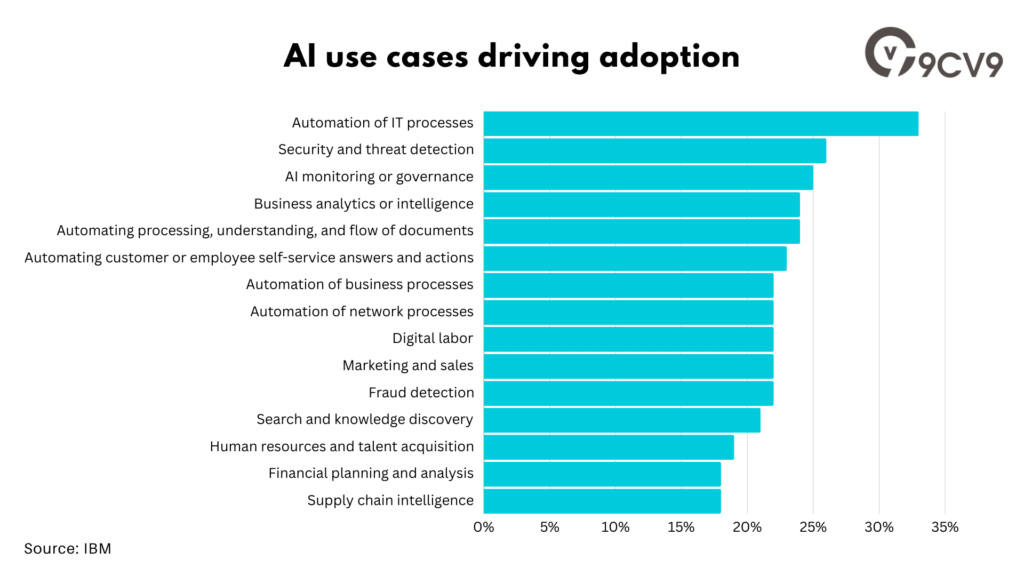
The breadth of AI use cases driving adoption among surveyed companies currently exploring or deploying AI underscores the diverse range of applications where artificial intelligence is making an impact across various facets of business operations. From automating IT processes and enhancing security and threat detection to optimizing business analytics and intelligence, AI is revolutionizing traditional workflows and driving efficiencies. Additionally, the automation of document processing, customer and employee self-service interactions, and network processes highlights AI’s role in streamlining operational tasks and improving productivity. Furthermore, the utilization of AI for digital labor, marketing and sales, fraud detection, and search and knowledge discovery reflects its versatility in addressing a wide array of business needs, from improving customer experiences to mitigating risks and optimizing decision-making. As organizations continue to explore and deploy AI across these key areas, they are poised to unlock new opportunities for innovation, growth, and value creation in the digital age.
41. 33% say limited AI skills and expertise the main factor hindering them at adopting AI
(IBM)
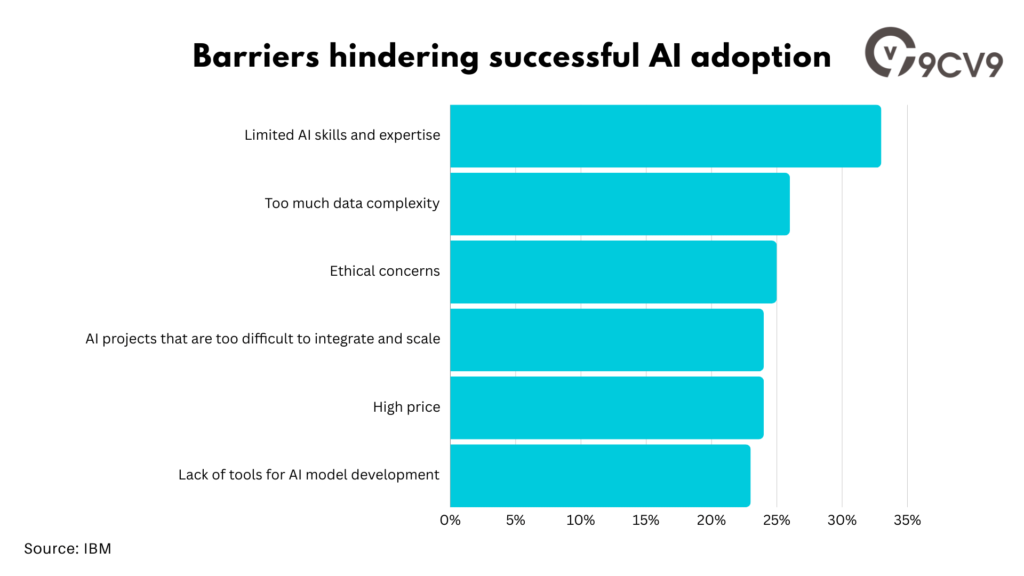
The identification of key barriers hindering successful AI adoption at enterprises, whether exploring or deploying AI, sheds light on the challenges organizations face in harnessing the full potential of artificial intelligence. Limited AI skills and expertise emerge as the primary obstacle, with 33% of respondents citing this issue. Addressing this barrier requires investment in talent development and training programs to build a skilled workforce capable of effectively leveraging AI technologies. Additionally, the complexity of managing vast amounts of data (25%) poses a significant challenge, underscoring the importance of data management strategies and tools to streamline data processing and analysis. Ethical concerns surrounding AI applications (23%) highlight the need for organizations to prioritize ethical frameworks and guidelines to ensure responsible AI use. Furthermore, difficulties in integrating and scaling AI projects (22%), high costs (21%), and a lack of tools for AI model development (21%) present additional hurdles that require strategic planning and resource allocation to overcome. By addressing these barriers comprehensively, organizations can unlock the transformative potential of AI and drive sustainable growth and innovation in the digital era.
42. 57% say data privacy concern one of the biggest inhibitors of generative AI
(IBM)
The findings that data privacy (57%) and concerns regarding trust and transparency (43%) are the primary inhibitors of generative AI, according to IT professionals at surveyed organizations not exploring or implementing generative AI, highlight significant barriers to its adoption. These concerns reflect a growing awareness of the ethical implications associated with generative AI technologies, particularly in terms of data privacy protection and the potential for misuse or manipulation of generated content. Additionally, the acknowledgment by 35% of respondents that a lack of skills for implementation poses a significant inhibitor underscores the importance of talent development and training programs to address skill gaps and build organizational capacity for deploying and managing generative AI solutions effectively. As organizations navigate these challenges, prioritizing data privacy, trust, and transparency, along with investing in skill development, will be crucial for fostering responsible and ethical adoption of generative AI technologies while maximizing their potential for innovation and value creation.
43. Between 2015 and 2019, the number of companies using AI grew by 270%
(Gartner)
Between 2015 and 2019, the remarkable growth in the number of companies leveraging artificial intelligence (AI) technologies surged by 270%, underscoring the rapid adoption of AI across industries. The significant increase in AI implementation over the four years from 2015 to 2019, from 10% to 37% respectively, of survey respondents reporting deployment or imminent deployment of AI, highlights the rapid pace of adoption and integration of artificial intelligence technologies across enterprises. This growth represents a 270% increase, indicative of the escalating recognition among businesses of AI’s potential to drive innovation, efficiency, and competitive advantage. The shift signifies a transformative shift in organizational strategies, with more companies recognizing the value of AI in enhancing operations, customer experiences, and decision-making processes. As AI technologies continue to evolve and mature, this trend is likely to persist, with AI becoming increasingly pervasive across industries, reshaping business landscapes and fueling digital transformation efforts worldwide.
44. 83% of executives believe AI is a strategic priority for their businesses
(Cisco)
The overwhelming belief among executives that AI is a strategic priority for their businesses, with 83% expressing this sentiment, reflects the growing recognition of AI’s transformative potential across industries. As businesses navigate an increasingly complex and competitive landscape, AI offers unprecedented opportunities to drive innovation, enhance efficiency, and unlock new sources of value. By leveraging AI technologies such as machine learning, natural language processing, and computer vision, businesses can gain valuable insights, automate processes, and deliver personalized experiences to customers. Moreover, as AI continues to evolve and mature, it is becoming increasingly integral to strategic decision-making and long-term business planning. By prioritizing AI initiatives, businesses can position themselves for success in the digital age, driving growth, resilience, and competitiveness in an AI-driven world. Overall, the widespread acknowledgment of AI as a strategic priority underscores its significance as a catalyst for innovation and transformation in the modern business landscape.
45. 75% of executives say that AI will allow them to move into new businesses and ventures
(Cisco)
The acknowledgment by 75% of executives that AI will enable them to venture into new businesses reflects a profound understanding of AI’s potential to drive innovation and expansion. As businesses seek to stay competitive and adapt to evolving market dynamics, AI offers unparalleled opportunities to explore new markets, launch innovative products and services, and create new revenue streams. By harnessing AI technologies such as predictive analytics, automation, and personalized recommendation engines, businesses can identify emerging trends, capitalize on untapped opportunities, and differentiate themselves in crowded markets. Moreover, AI empowers executives to make informed decisions, mitigate risks, and optimize resource allocation, thereby enabling strategic diversification and growth. Overall, the recognition of AI’s role in facilitating business expansion underscores its transformative impact on organizational strategies and underscores the imperative for businesses to embrace AI as a driver of innovation and competitive advantage.
46. 86% of CEOs agree that AI and business go hand-in-hand since AI is mainstream technology in their offices
(PwC)
The consensus among 86% of CEOs that AI and business are inherently intertwined underscores the pervasive influence of AI as a mainstream technology in modern offices. As businesses increasingly integrate AI into their operations, AI-driven solutions have become indispensable tools for driving innovation, efficiency, and competitiveness. From automating routine tasks to enabling data-driven decision-making and enhancing customer experiences, AI has permeated virtually every aspect of business operations. Moreover, as AI technologies continue to evolve and mature, CEOs recognize the imperative of leveraging AI to stay ahead of the curve and capitalize on emerging opportunities. By embracing AI as a strategic enabler, businesses can unlock new sources of value, foster innovation, and navigate complex challenges in today’s dynamic business landscape. Overall, the acknowledgment of AI’s integral role in business underscores its transformative potential and underscores the need for organizations to embrace AI as a driver of sustainable growth and success.
47. There is a 75% increase in AL projects deployed from 2021 to 2022
(PwC)
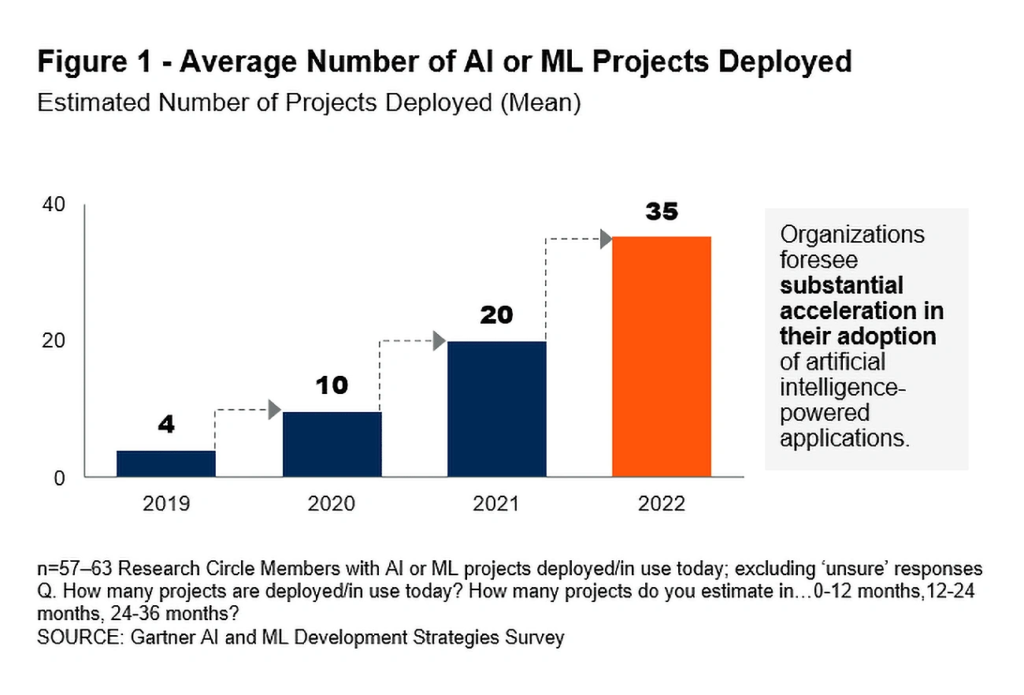
The significant increase in the deployment of AI projects from 2021 to 2022, as indicated by a 75% rise, reflects a notable acceleration in the adoption of AI-powered applications across industries. This surge in AI adoption underscores the growing recognition among businesses of AI’s potential to drive innovation, efficiency, and competitive advantage. As organizations increasingly prioritize digital transformation and seek to harness the power of AI to unlock new opportunities and address complex challenges, the demand for AI-driven solutions has surged. Moreover, advancements in AI technologies, coupled with greater accessibility and affordability of AI tools and platforms, have further facilitated the adoption of AI across diverse sectors. This data signals a broader trend towards AI becoming an integral part of business operations, driving productivity, insights, and value creation. As AI continues to evolve and mature, its transformative impact on businesses and society is expected to become even more pronounced, shaping the future of work, commerce, and innovation.
48. Businesses already using AI at scale are performing an average of 11.5% better than those who are not
(Microsoft)
The statistic indicating that businesses using AI at scale outperform those that are not by an average of 11.5% underscores the significant competitive advantage conferred by AI adoption in today’s business landscape. By leveraging AI technologies to automate processes, optimize decision-making, and unlock valuable insights from data, businesses can enhance operational efficiency, improve productivity, and drive innovation. Moreover, AI enables organizations to better understand customer needs, personalize experiences, and adapt to changing market dynamics, thereby gaining a competitive edge in increasingly digital and data-driven markets. As AI continues to evolve and mature, businesses that prioritize AI adoption and integration into their operations are likely to maintain a strategic advantage, positioning themselves for sustained success and growth in the long term. Overall, the performance gap between businesses using AI at scale and those that are not underscores the transformative impact of AI on business outcomes and underscores the imperative for organizations to embrace AI as a driver of innovation and competitiveness.
49. AI will power 95% of customer interactions by 2025
(AI Business)
The prediction by Servion Global Solutions that 95% of customer interactions will be powered by AI by 2025 underscores the profound impact of artificial intelligence on reshaping customer service and engagement across industries. As businesses increasingly leverage AI-powered solutions to automate processes, personalize interactions, and deliver seamless customer experiences, AI is becoming an indispensable tool for meeting evolving customer expectations and driving satisfaction. The rise of AI-driven customer interactions through channels such as customer service calls and online chat forums reflects a broader trend towards AI becoming a ubiquitous presence in customer-facing operations. By harnessing the power of AI, businesses can enhance efficiency, scalability, and responsiveness in addressing customer needs, ultimately driving loyalty and retention. Overall, the prediction highlights the transformative potential of AI in revolutionizing customer interactions and underscores the imperative for businesses to embrace AI as a key enabler of competitive advantage in the digital age.
50. Around 40% of marketers agree that using AI for email marketing generates higher market revenue
(Statista)

The finding that approximately four in ten marketers reported that artificial intelligence contributed to revenue improvement in their email marketing highlights the significant impact of AI in driving marketing effectiveness and business outcomes. By leveraging AI-powered tools and techniques, marketers can enhance the targeting, personalization, and optimization of email campaigns, leading to improved engagement, conversion, and ultimately, revenue generation. AI enables marketers to analyze vast amounts of data, predict customer behavior, and deliver more relevant and timely email content to recipients, thereby maximizing the effectiveness of email marketing efforts. The positive correlation between AI adoption and revenue improvement underscores the value of AI in empowering marketers to achieve their business objectives and drive tangible results in today’s competitive digital landscape. Overall, the finding underscores the growing importance of AI in email marketing and its potential to drive measurable business impact for organizations.
AI Usage Statistics, Numbers and Data in 2024
51. 56% of business owners are using AI for customer service
(Forbes)
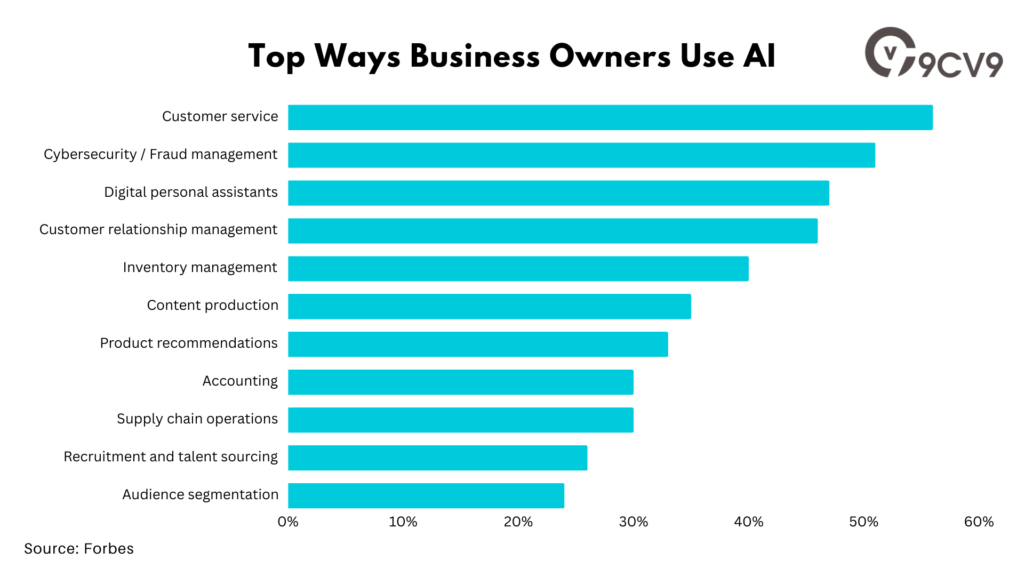
The statistic revealing that 56% of business owners are leveraging AI for customer service highlights a significant trend in the adoption of artificial intelligence technologies to enhance customer experiences and support functions. AI-powered solutions are increasingly being integrated into customer service operations to automate repetitive tasks, provide real-time assistance, and deliver personalized interactions. From chatbots and virtual assistants to sentiment analysis and predictive analytics, AI enables businesses to streamline customer inquiries, resolve issues more efficiently, and deliver timely and relevant support across various channels. By harnessing the capabilities of AI for customer service, businesses can improve response times, reduce operational costs, and ultimately, foster greater customer satisfaction and loyalty. As AI continues to advance, its role in transforming customer service operations is poised to grow, driving innovation and reshaping the way businesses engage with their customers in the digital age.
52. 51% of business owners use AI for cybersecurity and fraud management
(Forbes)
The utilization of AI for cybersecurity and fraud management by 51% of business owners reflects a growing recognition of artificial intelligence’s pivotal role in safeguarding digital assets and mitigating emerging threats. As cyberattacks become increasingly sophisticated and prevalent, organizations are turning to AI-powered solutions to enhance their defense capabilities and proactively detect and respond to security breaches and fraudulent activities. AI algorithms are adept at analyzing vast amounts of data in real-time, identifying anomalous patterns, and predicting potential security incidents before they escalate. Moreover, AI-driven threat intelligence enables organizations to stay ahead of evolving threats and adapt their security measures accordingly. By leveraging AI for cybersecurity and fraud management, businesses can bolster their resilience to cyber threats, protect sensitive information, and maintain trust and confidence among customers and stakeholders in an increasingly digital landscape.
53. 73% of businesses use or plan to use AI-powered chatbots for instant messaging
(Forbes)
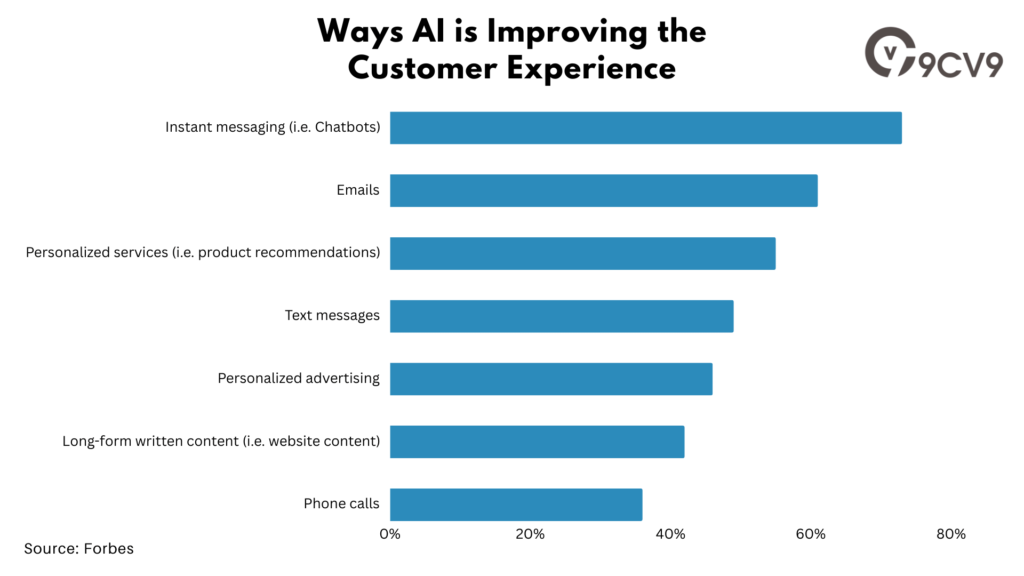
The statistic that 73% of businesses either use or plan to use AI-powered chatbots for instant messaging underscores the growing importance of artificial intelligence in revolutionizing customer communication channels. AI-powered chatbots offer businesses an efficient and scalable way to provide instant support, answer queries, and engage with customers in real-time across various digital platforms. By leveraging natural language processing and machine learning algorithms, chatbots can understand and respond to customer inquiries accurately, providing personalized assistance and improving overall customer experiences. Moreover, chatbots operate 24/7, ensuring consistent availability and responsiveness, which is particularly valuable for businesses with global customer bases or those operating in industries with high customer service demands. As businesses continue to embrace AI-powered chatbots, they are poised to enhance customer engagement, drive operational efficiency, and gain a competitive edge in the digital marketplace.
54. 53% apply AI to improve production processes
(Forbes)
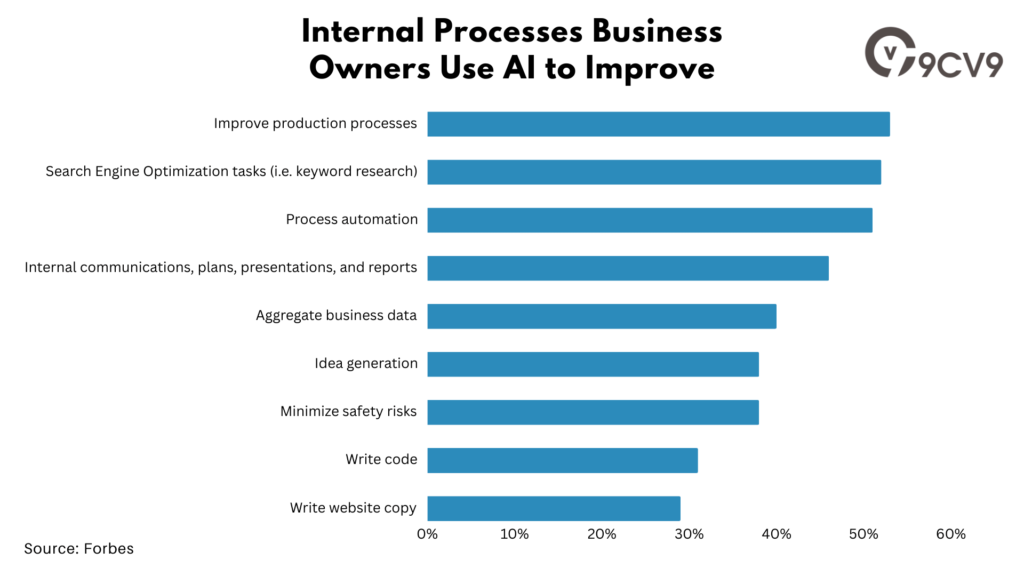
AI is catalyzing a paradigm shift in business management, empowering companies to enhance productivity and agility across various facets of operations. As revealed by the Forbes Advisor survey, AI adoption spans a spectrum of business functions, with a notable 53% of businesses leveraging AI to optimize production processes, thereby streamlining workflows and improving efficiency. Furthermore, 51% of companies are embracing AI for process automation, facilitating the elimination of manual tasks and the acceleration of routine operations. Additionally, AI’s role in search engine optimization (SEO) is prominent, with 52% of businesses utilizing it for tasks such as keyword research to enhance online visibility and drive traffic. Beyond these core functions, AI is instrumental in data aggregation (40%), idea generation (38%), and minimizing safety risks (38%), illustrating its versatility in addressing diverse business challenges. Moreover, AI’s impact extends to internal communications and content creation, with 46% of businesses streamlining processes related to plans, presentations, reports, and even leveraging AI for writing code (31%) and website copy (29%). These findings underscore AI’s transformative potential in revolutionizing business management practices, driving innovation, and fostering competitiveness in the digital age.
55. 64% of business owners anticipate AI will improve customer relationships
(Forbes)
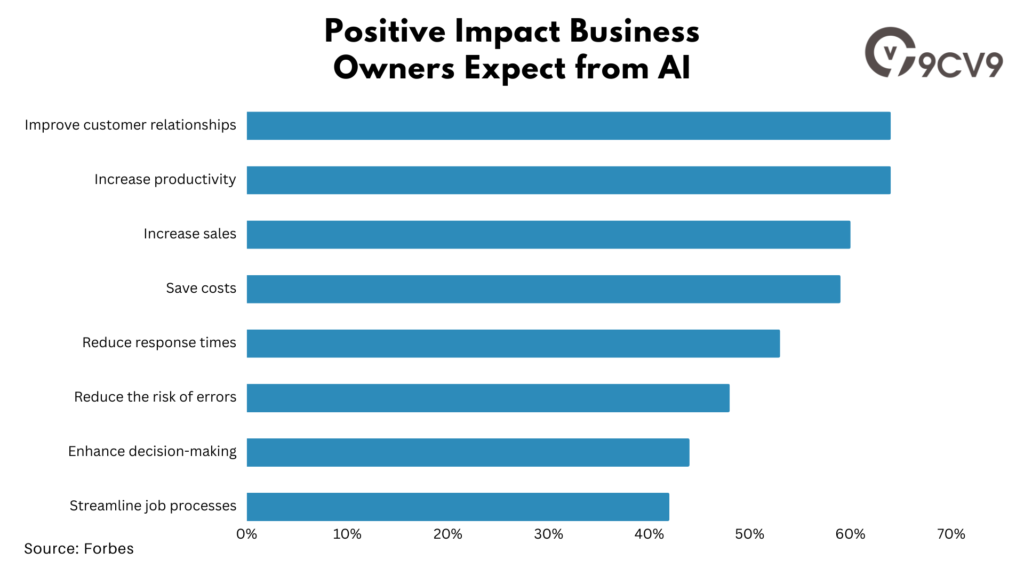
The widespread anticipation among business owners regarding the benefits of artificial intelligence underscores its potential to drive transformative changes across various aspects of business operations. A significant majority of respondents (64%) anticipate AI to enhance customer relationships and boost productivity, reflecting its capability to optimize customer interactions and streamline workflows. Moreover, the expectation of AI driving sales growth by 60% of respondents highlights its potential to unlock new revenue opportunities and drive business expansion. Additionally, AI is perceived as a valuable asset for improving decision-making (44%), decreasing response times (53%), and minimizing errors (48%), emphasizing its role in enhancing operational efficiency and effectiveness. Furthermore, businesses anticipate AI to deliver cost savings (59%) and streamline job processes (42%), underscoring its potential to drive cost efficiencies and operational optimization. These findings collectively illustrate the widespread recognition of AI as a strategic enabler for driving innovation, growth, and competitiveness in the evolving business landscape.
56. 24% of business owners worry AI might affect their business’s visibility on search engines
(Forbes)
The concern regarding the potential impact of AI on website traffic from search engines highlights a significant consideration for businesses in their digital marketing strategies. With 24% of respondents expressing worry about AI affecting their business’s visibility on search engines, there is a recognition of the potential implications AI algorithms may have on search engine rankings and organic traffic. However, it is noteworthy that the majority of respondents (64%) do not share this concern, indicating a level of confidence in their current strategies or a belief that AI’s impact on search engine visibility may be minimal. Additionally, 12% of respondents remain unsure, underscoring the complexity and uncertainty surrounding the intersection of AI and search engine optimization (SEO). As AI continues to shape the digital landscape, businesses will need to monitor developments closely and adapt their SEO strategies accordingly to maintain visibility and competitiveness in online search results.
57. 40% of Business Owners Are Concerned About AI Dependence
(Forbes)
The concerns expressed by business owners regarding technology dependence, technical abilities, and potential biases in AI systems highlight the complexities and challenges associated with AI adoption. With 43% of respondents expressing worry about becoming too reliant on AI, there is a recognition of the need to strike a balance between leveraging AI’s capabilities and maintaining autonomy and control over business operations. Additionally, the apprehension of 35% of entrepreneurs regarding the technical skills required to use AI efficiently underscores the importance of investing in training and upskilling initiatives to bridge skill gaps and empower employees to leverage AI effectively. Furthermore, the concern about potential bias errors in AI systems, expressed by 28% of respondents, underscores the critical need for ethical considerations and responsible AI practices to mitigate risks and ensure fairness and transparency in AI-driven decision-making processes. As businesses navigate the complexities of AI adoption, addressing these concerns will be essential to fostering trust, maximizing the benefits of AI, and mitigating potential pitfalls in the digital age.
58. Around 33% of Businesses Are Concerned About Misinformation From AI
(Forbes)
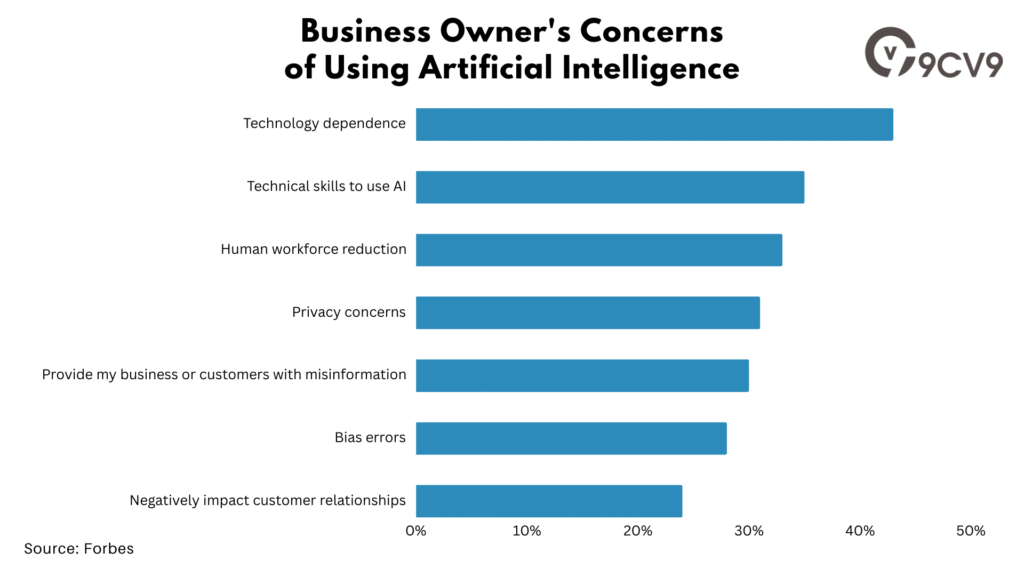
The concerns highlighted regarding AI integration underscore the importance of responsible AI usage and ethical considerations in business operations. With 30% of respondents expressing worry about AI-generated misinformation, there is a recognition of the potential risks associated with relying on AI algorithms for decision-making and information dissemination. Similarly, the concern of 24% of respondents regarding the negative impact of AI-generated misinformation on customer relationships highlights the importance of maintaining trust and transparency in business interactions. Additionally, privacy concerns surrounding data security and privacy in the age of AI, expressed by 31% of businesses, underscore the need for robust data protection measures and adherence to privacy regulations. Addressing these concerns will be essential to fostering trust, ensuring ethical AI practices, and mitigating risks associated with misinformation and data privacy breaches. Moreover, it underscores the importance of implementing safeguards and accountability mechanisms to uphold integrity and transparency in AI-driven processes, ultimately enhancing trust and confidence among stakeholders.
59. 97% of business owners believe that ChatGPT will have a positive impact on their operations
(Forbes)
The overwhelming belief among the majority of business owners regarding the positive impact of ChatGPT on their operations is a testament to the transformative potential of AI-driven language models in revolutionizing business communication and operations. With 97% of respondents identifying at least one aspect that will benefit their business, there is a clear recognition of the value that ChatGPT brings in enhancing productivity, efficiency, and customer engagement. Whether it’s automating customer support inquiries, generating content, or facilitating internal communication, ChatGPT offers a versatile and powerful toolset that empowers businesses to streamline workflows, drive innovation, and deliver exceptional experiences to their customers. Moreover, the widespread acceptance of ChatGPT underscores its potential to drive tangible business outcomes and create new opportunities for growth and success in the digital age. As businesses continue to leverage ChatGPT and similar AI technologies, they are poised to unlock new levels of efficiency, creativity, and competitiveness in an increasingly AI-driven marketplace.
60. 74% of business owners anticipate ChatGPT assisting in generating responses to customers through chatbots
(Forbes)
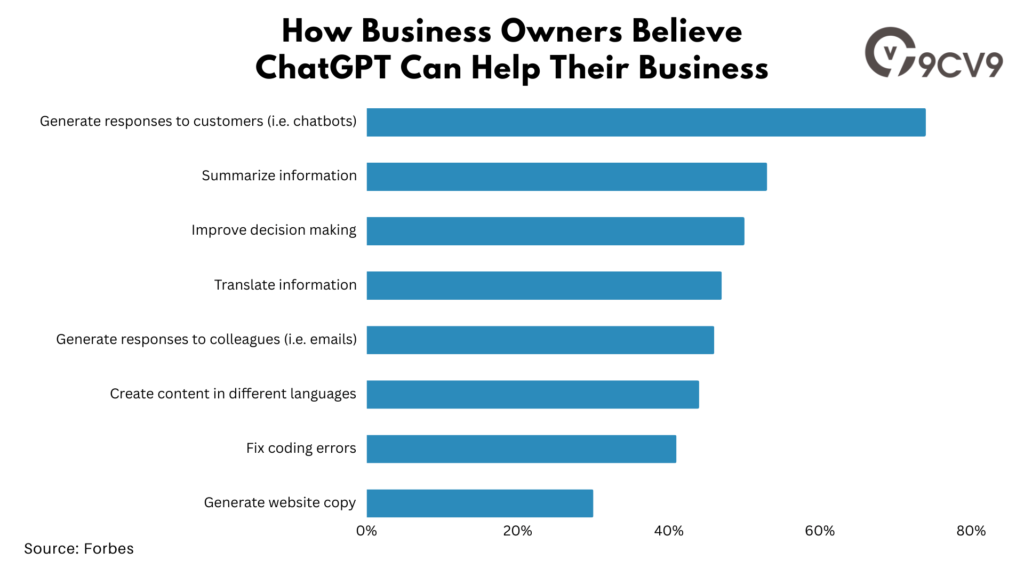
The anticipation among respondents regarding the potential benefits of ChatGPT reflects its versatility and transformative impact across various aspects of business operations. With 74% of respondents expecting ChatGPT to assist in generating responses to customers through chatbots, there is a recognition of its role in enhancing customer service and engagement. Moreover, businesses foresee AI streamlining communication with colleagues via email (46%), highlighting its potential to optimize internal workflows and collaboration. Additionally, the expectation of AI assisting in generating website copy (30%), fixing coding errors (41%), translating information (47%), and summarizing information (53%) underscores its value in automating repetitive tasks and improving efficiency. Furthermore, half of the respondents believe ChatGPT will contribute to improved decision-making (50%) by providing valuable insights and analysis. Lastly, the anticipation of AI enabling the creation of content in different languages (44%) reflects its potential to expand businesses’ reach and global presence. Overall, these findings highlight the significant role of ChatGPT in driving innovation, productivity, and competitiveness in the digital age.
61. 90% of business owners believe that ChatGPT will positively impact their businesses within the next 12 months
(Forbes)
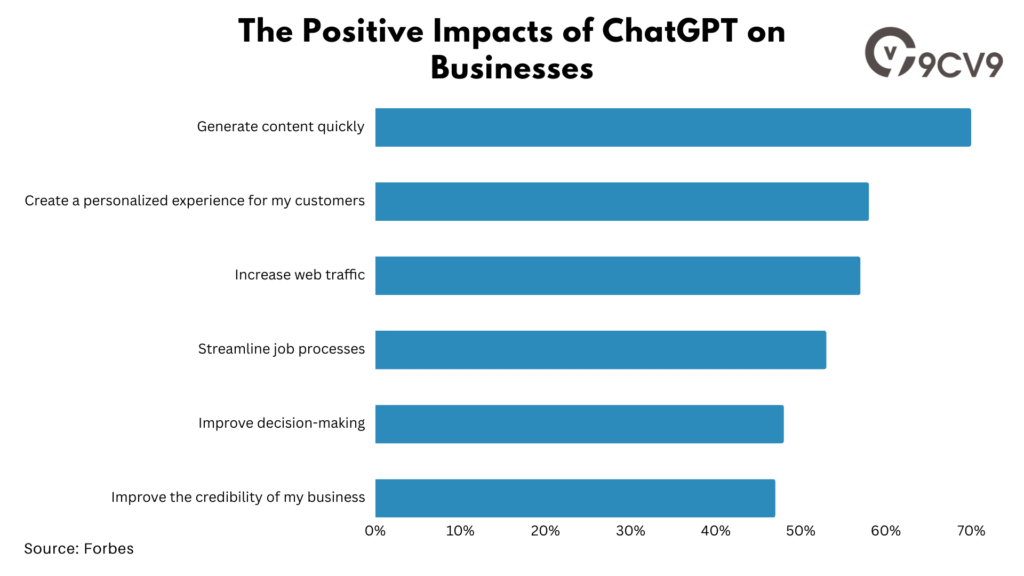
The overwhelming optimism among business owners, with 90% believing that ChatGPT will have a positive impact on their businesses within the next 12 months, underscores the high expectations and confidence in the transformative potential of AI-driven language models. This level of optimism reflects a strong belief in ChatGPT’s ability to drive tangible benefits and improvements across various aspects of business operations in a relatively short timeframe. As businesses increasingly recognize the value of AI technologies in enhancing productivity, efficiency, and customer experiences, the widespread anticipation of ChatGPT’s positive impact highlights its role as a strategic enabler for driving innovation and competitiveness in the digital era. Moving forward, businesses are poised to leverage ChatGPT to unlock new opportunities, streamline workflows, and deliver enhanced value to customers, thereby driving sustainable growth and success in the dynamic and evolving business landscape.
62. AI is expected to improve employee productivity by 40%
(PwC)
The data suggesting that AI has the potential to enhance employee productivity by around 40% by 2035 highlights the transformative impact of AI technologies on the future of work. As AI-driven automation and augmentation become more prevalent in the workplace, employees can leverage AI-powered tools and systems to streamline workflows, automate repetitive tasks, and focus on higher-value activities. By offloading routine tasks to AI, employees can devote more time and energy to tasks that require creativity, problem-solving, and critical thinking, thereby driving productivity gains and fostering innovation. Moreover, AI can augment human capabilities by providing real-time insights, personalized recommendations, and decision support, empowering employees to make better-informed decisions and drive better business outcomes. Overall, the projected productivity gains from AI underscore its potential to reshape the way we work and unlock new levels of efficiency, effectiveness, and competitiveness in the digital age.
63. 48% of businesses say they use data analysis, machine learning, or AI tools to address data quality issues
(O’Reilly)
The acknowledgment that adopting AI can improve data quality, with nearly half of respondents utilizing data analysis, machine learning, or AI tools to address data quality issues, underscores the transformative potential of AI in enhancing data management practices. By leveraging AI-driven analytics and machine learning algorithms, organizations can detect and address latent data quality issues more effectively, leading to more accurate, reliable, and actionable insights. Moreover, AI-powered data quality solutions can automate the identification of anomalies, inconsistencies, and errors in data, enabling organizations to proactively mitigate risks and ensure data integrity. As businesses increasingly rely on data-driven decision-making, the ability to maintain high-quality data assets becomes paramount for driving business outcomes and maintaining competitive advantage. Therefore, the integration of AI into data quality processes represents a strategic imperative for organizations seeking to unlock the full value of their data assets and drive innovation in the digital age.
64. AI algorithms increase lead generation by as much as 50%
(Harvard Business Review)
The utilization of AI algorithms in sales processes offers compelling advantages, as evidenced by recent data indicating significant improvements across various metrics. By leveraging AI to analyze data, businesses can gain valuable insights into product profitability and customer purchasing habits, enabling more informed decision-making and targeted sales strategies. The reported increases in leads by 50%, reductions in call times by 60%, and overall cost reductions of up to 60% further demonstrate the transformative impact of AI in sales operations. AI enables businesses to streamline lead generation processes, optimize sales calls through personalized recommendations and insights, and reduce operational costs by automating repetitive tasks and improving efficiency. Overall, the adoption of AI in sales demonstrates its potential to drive tangible improvements in performance, productivity, and profitability, positioning businesses for success in today’s competitive market landscape.
Job and Employment in AI Statistics, Numbers, and Data in 2024
65. AI will create 97 million new jobs by 2025
(World Economic Forum)
The projection that AI will generate 97 million new jobs by 2025 underscores the transformative impact of artificial intelligence on the global labor market. Despite concerns about job displacement due to automation, AI is poised to create a multitude of new opportunities across various industries and sectors. These jobs span a wide range of roles, from AI specialists and data scientists to automation technicians and customer experience managers. Moreover, AI’s capacity to augment human capabilities and streamline workflows is expected to lead to the creation of entirely new job categories that we can only begin to imagine. However, it’s essential to ensure that these opportunities are accessible to all, addressing potential skills gaps and fostering inclusive growth. As organizations and policymakers navigate the evolving landscape of work in the AI era, proactive measures to reskill and upskill the workforce will be crucial in harnessing the full potential of AI-driven innovation while ensuring sustainable and equitable economic development.
66. 20% of managers say they do not have employees with the right skills in place to use new AI or automation tools
(IBM)
The revelation that one-in-five organizations report a lack of employees with the necessary skills to effectively utilize new AI or automation tools, coupled with 16% struggling to find new hires possessing these skills, underscores a significant challenge in the workforce readiness for technological advancements. As organizations increasingly adopt AI and automation technologies to drive innovation and efficiency, the demand for skilled professionals proficient in these areas continues to grow. However, the skills gap poses a barrier to fully realizing the potential of these technologies and leveraging them effectively. Addressing this challenge requires a multi-faceted approach, including investing in training and upskilling programs for existing employees, fostering partnerships with educational institutions to develop relevant curricula, and implementing strategies to attract and retain talent with the requisite skills. By proactively addressing the skills gap, organizations can position themselves for success in the rapidly evolving digital landscape and harness the full potential of AI and automation technologies to drive sustainable growth and competitiveness.
67. 55% are using AI to reduce manual or repetitive tasks with automation tools
(IBM)
The statistic revealing that 55% of organizations are leveraging AI to reduce manual or repetitive tasks through automation tools underscores the transformative impact of artificial intelligence on streamlining workflows and enhancing operational efficiency. By automating routine tasks, organizations can optimize resource allocation, improve productivity, and free up valuable human resources to focus on more strategic initiatives. From data entry and processing to customer service and administrative tasks, AI-powered automation tools enable organizations to achieve significant time and cost savings while minimizing errors and increasing throughput. Moreover, automation facilitates scalability, allowing organizations to adapt to changing demands and scale operations efficiently. As companies continue to embrace AI-driven automation, they are poised to unlock new opportunities for innovation, growth, and competitiveness in the digital age.
68. Only 34% of managers are currently training employees to work with new AI tools
(IBM)
The revelation that only 34% of organizations are currently training or reskilling employees to collaborate with new automation and AI tools underscores a critical gap in workforce readiness for technological advancements. As automation and AI technologies become increasingly integrated into business operations, the need for a skilled workforce capable of effectively utilizing these tools is paramount. Training and reskilling initiatives play a vital role in preparing employees to leverage automation and AI technologies to their full potential, enabling them to adapt to changing job roles, acquire new skills, and maximize productivity. Moreover, investing in employee training fosters a culture of innovation, encourages continuous learning, and enhances employee engagement and retention. By prioritizing training and reskilling programs, organizations can empower their workforce to embrace technological change, drive digital transformation, and thrive in the evolving workplace of the future.
69. Around 33% of Businesses Are Concerned AI Will Cause Workforce Reduction
(Forbes)
The apprehension surrounding the potential impact of AI integration on the workforce is a significant concern for businesses and the wider public alike. With 33% of survey participants expressing concern about AI implementation leading to a reduction in the human workforce, there is a recognition of the potential implications of automation and AI technologies on employment opportunities. This concern is mirrored by the wider public, with 77% of consumers also expressing apprehension about human job loss due to AI advancements. As businesses navigate the complexities of AI adoption, addressing these concerns will be essential to fostering trust, ensuring responsible deployment of AI technologies, and implementing strategies to mitigate any adverse effects on the workforce. Moreover, it underscores the importance of investing in workforce development, reskilling, and upskilling initiatives to empower employees to adapt to technological changes and thrive in the evolving digital economy. By proactively addressing these concerns, businesses can harness the transformative potential of AI while ensuring inclusivity, fairness, and sustainability in the workforce of the future.
70. Transportation and storage workers face a 56.4% risk of job automation from AI
(PwC)
The concern over AI’s impact on job displacement is understandable given the potential for automation to reshape industries and alter traditional employment landscapes. The data provided illustrates the varying degrees of risk across different sectors, with industries such as transportation and storage facing higher rates of job automation compared to sectors like education. While job displacement is a valid concern, it’s important to recognize that AI can also create new job opportunities and transform existing roles rather than entirely eliminating them. Industries may evolve as automation enables workers to focus on higher-value tasks while repetitive or mundane activities are automated. Additionally, reskilling and upskilling initiatives can help workers adapt to the changing demands of the labor market and mitigate the potential negative impacts of job automation. While it’s prudent for individuals to stay informed about industry trends and consider potential career adjustments, it’s also essential to remain optimistic about the opportunities that AI and automation can bring, both for businesses and the workforce as a whole.
71. AI is expected to replace 16% of all US jobs in less than half a decade
(Forrester)
The projection that AI and machine learning technologies could potentially replace 16% of all US jobs within a relatively short timeframe is indeed significant and underscores the disruptive nature of these technologies. However, it’s crucial to recognize that while certain jobs may be automated, new opportunities are also likely to emerge as a result of AI adoption. The estimate that the AI market will create 9% of new jobs in the US suggests that while there may be a net loss of 7% in terms of job displacement, there will still be a considerable number of new roles created to support and leverage AI technologies. Moreover, the nature of these new jobs is likely to evolve, requiring different skill sets and competencies compared to the roles being replaced. Therefore, while there may be short-term challenges associated with job displacement, the long-term outlook suggests that AI adoption has the potential to drive innovation, productivity, and economic growth, ultimately creating a more dynamic and resilient workforce. Efforts to invest in education, training, and workforce development will be crucial in ensuring that individuals are equipped to succeed in the AI-driven economy of the future.
Conclusion
In conclusion, our exploration of the Top 71 Latest AI Statistics in 2024 has provided a comprehensive overview of the current state and future trajectory of artificial intelligence. From groundbreaking advancements in machine learning algorithms to the real-world applications transforming industries worldwide, the data presented here offers valuable insights into the transformative power of AI.
As we reflect on the myriad statistics and trends uncovered, several key takeaways emerge. Firstly, AI is not just a technological innovation but a catalyst for societal and economic change. Its impact spans across sectors, driving efficiency, innovation, and competitiveness. Secondly, while AI presents immense opportunities, it also poses challenges, particularly concerning ethics, privacy, and job displacement. Addressing these challenges requires a multi-faceted approach, involving collaboration between policymakers, industry leaders, and the broader community.
Furthermore, the data underscores the importance of continued investment in research, development, and education to unlock the full potential of AI responsibly. By fostering an ecosystem of innovation, nurturing talent, and promoting ethical AI practices, we can harness the transformative power of AI to address some of the most pressing challenges facing humanity, from healthcare and climate change to economic inequality and social justice.
As we look to the future, it is clear that AI will play an increasingly central role in shaping our world. By staying informed, adaptive, and proactive, we can navigate the complexities of the AI landscape and leverage its potential to drive positive change. Whether you’re a business leader seeking to stay ahead of the curve, a policymaker shaping AI policy, or an individual curious about the implications of AI on society, the insights shared in this blog serve as a valuable resource for understanding and navigating the evolving AI landscape.
In closing, we invite you to continue exploring, learning, and engaging with AI in a responsible and informed manner. Together, let us harness the power of artificial intelligence to build a more prosperous, equitable, and sustainable future for all.
Thank you for joining us on this journey through the Top 71 Latest AI Statistics in 2024. May the insights gained here inspire you to embrace the transformative potential of AI and contribute to a brighter tomorrow.
Stay curious, stay informed, and let’s shape the future of AI together.
If your company needs HR, hiring, or corporate services, you can use 9cv9 hiring and recruitment services. Book a consultation slot here, or send over an email to [email protected].
If you find this article useful, why not share it with your hiring manager and C-level suite friends and also leave a nice comment below?
We, at the 9cv9 Research Team, strive to bring the latest and most meaningful data, guides, and statistics to your doorstep.
To get access to top-quality guides, click over to 9cv9 Blog.
People Also Ask
What are the top industries leveraging AI in 2024?
AI is making significant strides in healthcare, finance, manufacturing, and retail, transforming operations and driving innovation.
How accurate are the AI statistics presented?
The AI statistics in this blog are meticulously fact-checked and verified to ensure accuracy and reliability.
What are the projected growth rates for the AI market?
The AI market is expected to experience exponential growth, with projections indicating a CAGR of 36.6% from 2024 to 2030.
How does AI impact job markets?
AI adoption may lead to job displacement in some sectors but is also expected to create new opportunities and roles, resulting in a net positive impact on employment.
Can AI help improve decision-making?
Yes, AI provides valuable insights and analysis that can enhance decision-making processes across various domains, including business strategy, resource allocation, and risk management.
What are the potential ethical concerns surrounding AI?
Ethical considerations in AI include issues related to bias, privacy, transparency, accountability, and the potential for misuse of AI technologies.
How does AI contribute to economic growth?
AI drives economic growth by increasing productivity, fostering innovation, creating new job opportunities, and enabling the development of new products and services.
Which countries are leading in AI adoption?
Countries like the United States, China, India, and Singapore are at the forefront of AI adoption, investing heavily in research, development, and deployment of AI technologies.
What are the key challenges in AI implementation?
Challenges in AI implementation include data quality issues, lack of skilled talent, ethical concerns, regulatory barriers, and integration complexities.
How does AI impact customer interactions?
AI-powered chatbots and virtual assistants are revolutionizing customer service, offering personalized support, quick responses, and 24/7 availability.
What role does AI play in healthcare?
AI is revolutionizing healthcare with applications such as medical imaging analysis, predictive analytics, drug discovery, and personalized medicine, leading to improved patient outcomes and operational efficiencies.
How does AI enhance cybersecurity?
AI enhances cybersecurity by detecting and mitigating threats in real-time, identifying patterns indicative of cyberattacks, and strengthening defenses against evolving security threats.
What are the implications of AI for privacy?
AI raises concerns about data privacy due to the vast amount of personal information collected and analyzed, necessitating robust privacy regulations and data protection measures.
How does AI impact the retail industry?
AI powers personalized recommendations, inventory management, demand forecasting, and customer experience enhancements in retail, driving sales and customer satisfaction.
How does AI contribute to environmental sustainability?
AI enables energy efficiency, resource optimization, environmental monitoring, and climate modeling, supporting efforts to mitigate climate change and promote sustainable development.
What are the key AI trends to watch in 2024?
Emerging trends in AI include advancements in natural language processing, edge computing, autonomous systems, responsible AI practices, and human-AI collaboration.
How does AI influence education?
AI transforms education through personalized learning experiences, adaptive tutoring systems, educational content creation, and administrative automation, catering to diverse student needs and improving educational outcomes.
What are the implications of AI for workforce reskilling?
AI necessitates ongoing workforce reskilling and upskilling initiatives to equip individuals with the necessary skills to thrive in an AI-driven economy and fill emerging job roles.
How does AI impact the financial sector?
AI drives automation, fraud detection, risk assessment, algorithmic trading, and customer service enhancements in finance, improving operational efficiency and regulatory compliance.
How does AI contribute to smart cities?
AI powers smart city initiatives by optimizing traffic flow, energy usage, waste management, public safety, and infrastructure maintenance, enhancing urban livability and sustainability.
What role does AI play in content creation?
AI automates content generation tasks such as writing articles, producing videos, and designing graphics, streamlining creative workflows and increasing content scalability.
How does AI affect the transportation industry?
AI enables autonomous vehicles, route optimization, predictive maintenance, demand forecasting, and traffic management, enhancing safety, efficiency, and sustainability in transportation systems.
What are the potential risks of AI?
Risks associated with AI include job displacement, algorithmic bias, loss of privacy, cybersecurity threats, social inequality, and misuse of AI technologies for malicious purposes.
How does AI impact cultural and creative industries?
AI facilitates content recommendation, curation, and personalization in cultural and creative sectors such as media, entertainment, and the arts, shaping audience engagement and cultural consumption patterns.
How does AI influence government services?
AI streamlines government services through automation, data analytics, citizen engagement platforms, and predictive modeling, improving service delivery and policy decision-making processes.
What are the implications of AI for international security?
AI presents opportunities and challenges in international security, affecting areas such as military warfare, cybersecurity, surveillance, and arms control, requiring careful consideration of ethical and geopolitical implications.
How does AI contribute to agricultural innovation?
AI supports precision agriculture through crop monitoring, soil analysis, yield prediction, pest detection, and autonomous farming equipment, optimizing resource use and increasing agricultural productivity.
What are the key considerations for AI regulation?
AI regulation should address ethical, legal, and technical aspects, including transparency, accountability, fairness, data privacy, cybersecurity, and compliance with existing laws and regulations.
Source:




























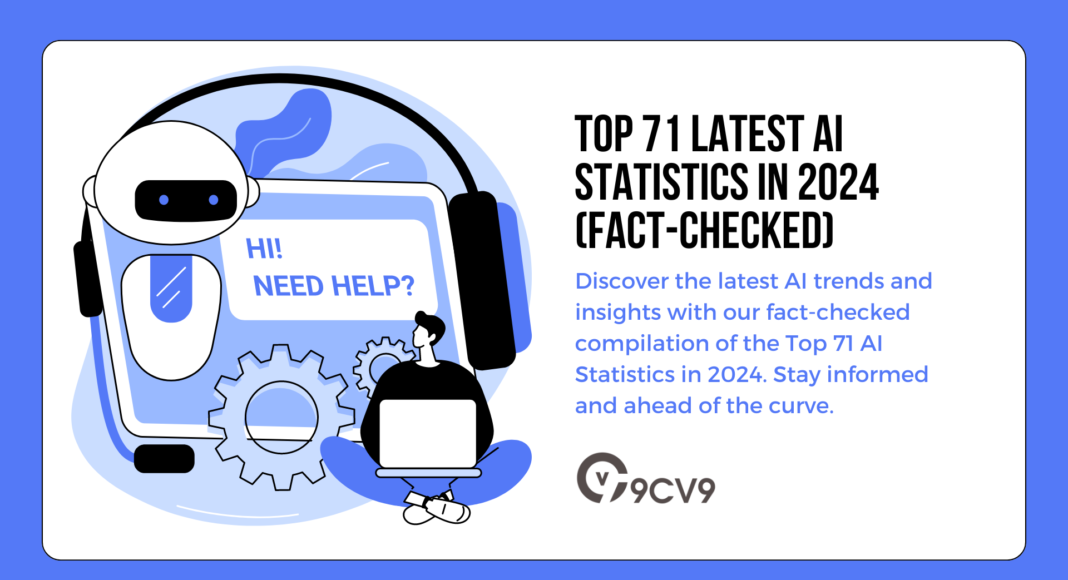


![Writing A Good CV [6 Tips To Improve Your CV] 6 Tips To Improve Your CV](https://blog.9cv9.com/wp-content/uploads/2020/06/2020-06-02-2-100x70.png)


